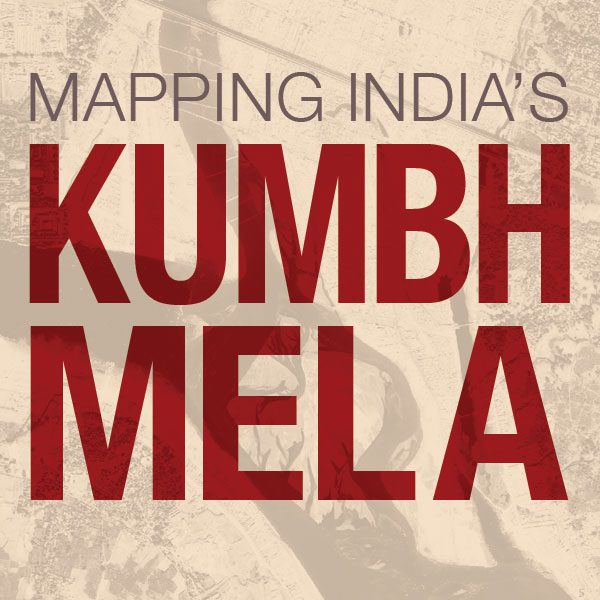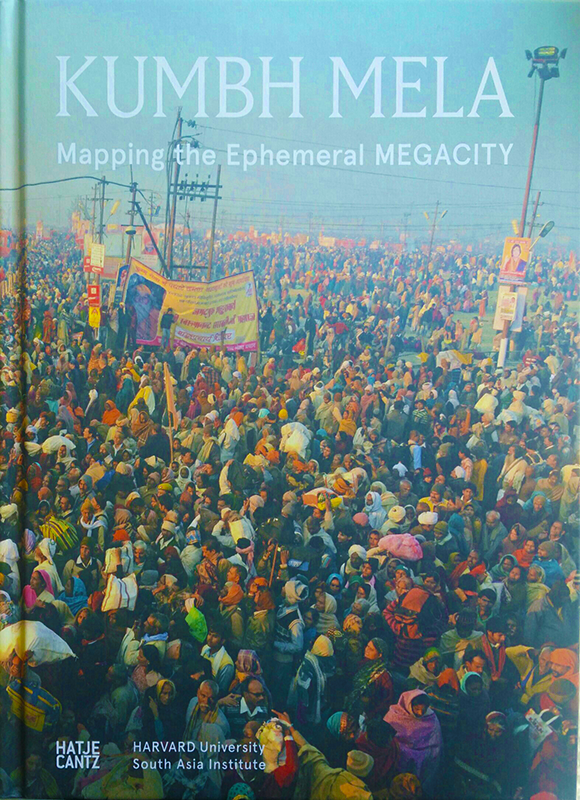Mapping India's Kumbh Mela

Jana Swasthya Project: 2015 Kumbh Mela
Real-Time-Disease Surveillance at the World’s Largest Gatherings
The JanaSwasthya Project is comprised of two components: a large-scale digital disease surveillance program, EMcounter, and a mass screening program for oral health, hypertension and diabetes offered to pilgrims, sadhus, security forces, and all visitors in Nashik and Trimbakeshwar.
The cornerstone of the project is a unique interactive visual analytic tool (“dashboard”) that provides critical disease surveillance data to health officials in real time.
South Asia Institute Coordinators:
Meena Hewett, Executive Director, SAI
Nora Maginn, Programs Manager, SAI
Namita Dharia, PhD Candidate in Anthropology, SAI Intern
Deonnie Moodie, PhD Candidate in the Study of Religion, SAI Intern
Aneesha Dharwadker, former Research Associate, GSD Urban India Initiative
Partners

Kumbh Mela: Mapping the Ephemeral Mega City
Many people are not familiar with Kumbh Mela, and yet it is the largest celebration on earth: depending on the positions of Jupiter, the sun and the moon, Hindus travel to certain places along holy rivers, the Ganges for example, to bathe and cleanse themselves of sin. With a 2013 attendance of approximately 34 million, the triennial pilgrimage requires that the communities hosting the gatherings create functioning temporary structures to transport, house and feed enormous crowds of people.
In 2013, a team from Harvard University monitored the large-scale event from its preparation through to the actual celebration, investigating and documenting the prototypes for flexible urban planning and offering organizers advice on issues around environmental protection. This substantial hardcover presents their comprehensive research findings along with city maps, aerial images and photographs of this most fascinating feat of urban planning.
The event featured Shri Akhilesh Yadav, Honorable Chief Minister of Uttar Pradesh, as well first-hand insights from Harvard scholars and Kumbh administrators who were on the ground during the festival in 2013. At an event on May 19 at the Museum of Fine Arts in Boston, faculty leaders from the Kumbh Mela project shared why studying the world's largest gathering provided so many lessons for fields such as business, public health, and urban planning. Watch SAI Director Tarun Khanna give a TedX talk about what the world can learn from the Kumbh Mela. In a recent column for The Financial Times, ‘How the wedding syndrome could fix India,’ Victor Mallet writes about how the Indian government manages one-off events but not longer-term projects, and cites SAI’s recently- published book on the Kumbh Mela. “It is the same Ganges on whose sandbanks the usually inept Uttar Pradesh government built a fully […] On Monday, January 18, the Harvard South Asia Institute (SAI) launched the book and exhibition Kumbh Mela: Mapping the Ephemeral Megacity in Mumbai at the Chhatrapati Shivaji Maharaj Vastu Sangrahalaya. At the Asia Society in New York on November 6, faculty leaders discussed how the Kumbh Mela is an opportunity to learn about megacities, possibly illuminating solutions to natural disasters that require temporary housing. "They had six weeks to get a city up and running with infrastructure, water supply, and electricity. That was an amazing surprise. But equally surprising was how quickly they dismantled it," says Rahul Mehrotra, Graduate School of Design, one of the faculty members who will speak about the project at the Asia Society on Nov. 6 "India is no stranger to confusion and that is why the much-talked-of jugaad, muddling through or miraculously rescuing a situation at the last moment is so common. But the Kumbh Mela, according to the Harvard team, was a carefully planned and efficiently executed operation." The Jana Swasthya Project has introduced a new mobile health surveillance system to help keep the millions of visitors healthy while they’re at the festival. The cornerstone of the project is a unique interactive visual analytic tool ("dashboard") that provides critical disease surveillance data to health officials in real time. On Monday, August 17, SAI launched the Kumbh Mela: Mapping the Ephemeral Megacity book and exhibition in Delhi, India. Shri Akhilesh Yadav, Honorable Chief Minister of Uttar Pradesh, was on hand to launch the book with Harvard faculty, to a crowd of over 250 people. Read an article from the Harvard Gazette about SAI's launch of "Kumbh Mela: Mapping the Ephemeral Megacity." Read the speech delivered by by Meera Gandhi, SAI Advisory Council member, CEO and Founder of The Giving Back Foundation, who introduced President Drew Faust at the launch of the book Kumbh Mela: Mapping the Ephemeral Megacity at Harvard University on April 16, 2015. The potential of mobile technology to change society was examined in an Exploratory Seminar titled ‘Using Cellphones to Change Societies’ hosted by SAI and the Radcliffe Institute for Advanced Study on September 4 and 5, 2014. The spirit of collaboration and community that made this year’s Kumbh Mela festival so successful was on vivid display at the Kumbh Mela: Mapping the Ephemeral City workshop August 29 and 30, 2013 at Harvard University’s Radcliffe Institute for Advanced Study This blog contains writing, posts, media and other impressions and information from the Harvard team’s research at the Kumbh Mela.Hindi version of Kumbh Mela book launched in Lucknow
“A chance of a lifetime”
TedX: Lessons from Kumbh Mela – Worlds Largest Gathering of Humanity
Delhi Notebook: How the wedding syndrome could fix India
Studying the Kumbh Mela from many perspectives
Asia Society: Lessons from the Kumbh Mela
Asia Society: The ‘Sheer Spectacle’ of Kumbh Mela
Faith in a Smart City
Tracking disease at the world’s largest religious festival
The Jana Swasthya Project at the 2015 Kumbh Mela: Ushering in India’s Mobile Health Revolution
Kumbh Mela book launch in Delhi
A powerful convergence
“I believe that everyone must enjoy this great feast of collaborative information”
Using cell phones to change society
Radcliffe Workshop:Mapping the Ephemeral City
Mapping the Kumbh Mela Blog





